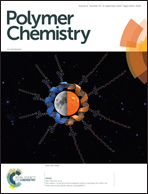Highly syndioselective coordination (co)polymerization of isopropenylstyrene†
Abstract
Coordination (co)polymerization of para-isopropenylstyrene (pIPSt) and meta-isopropenylstyrene (mIPSt), initiated by scandium (Sc) based catalysts, afforded new type of products, bearing pendant isopropenyl groups with perfect syndiotacity (rrrr > 99%). Sc catalysts demonstrated overwhelming chemoselectivity towards the vinyl group over the isopropenyl moiety of isopropenylstyrene. Compared to the constrained-geometry Sc catalysts, having electron-donating pyridyl methylene fluorenyl ligands Flu′CH2Py (1, Flu′ = C13H8; 2, Flu′ = 2,7-tBu2C13H6, Py = C5H5N), the half-sandwich Sc catalysts containing electron-withdrawing substituents [3, C13H8SiMe3Sc(CH2SiMe3)2(THF); 4, C5Me4PhSc(CH2C6H4NMe2-o)2] showed much higher catalytic activity under identical conditions. The activity of 4 could be over 2164 kg molSc−1 h−1 at room temperature at a lower monomer concentration (1 mol L−1). Moreover, copolymerization of pIPSt and styrene (St) proceeded fluently in a pathway close to ideal copolymerization, with closely matched monomer reactivity ratios: rpIPSt = 1.05, rSt = 0.83. Therefore, a series of statically random copolymers with pendant unsaturated olefinic groups, ranging from 5% to 90%, were accessed. These pendant isopropenyl groups could be readily converted into epoxide and bromide moieties at mild reaction conditions.



 Please wait while we load your content...
Please wait while we load your content...